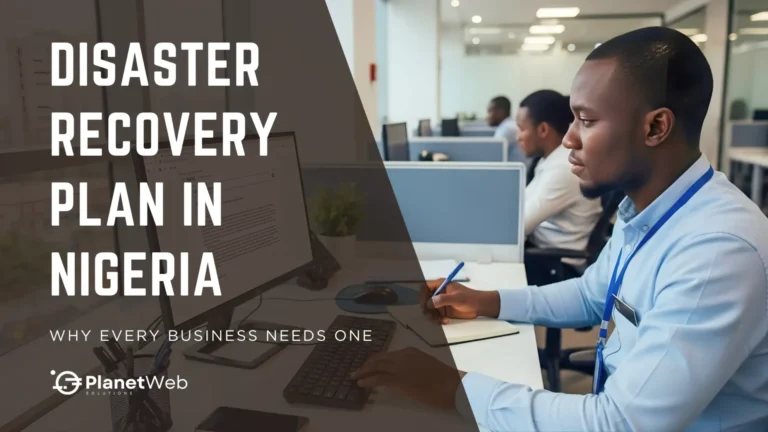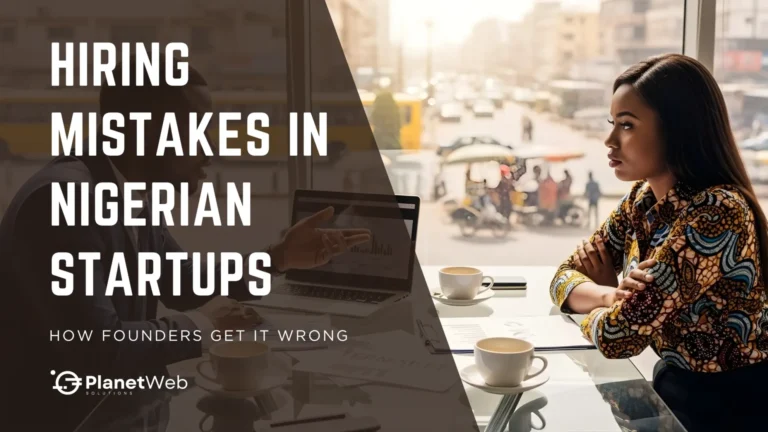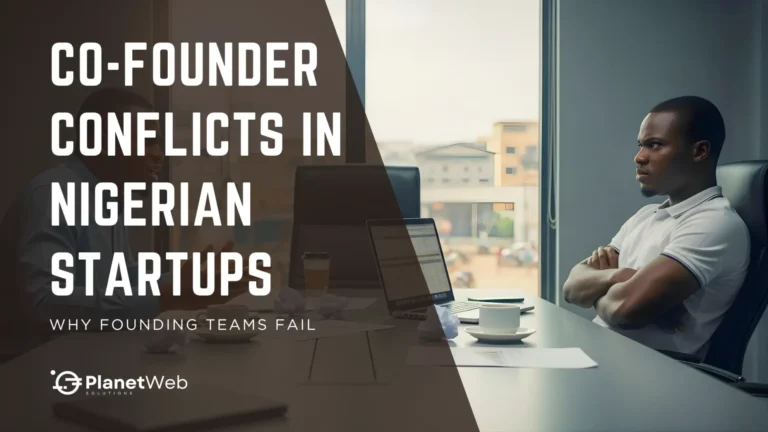Which Website Platform Is Best in Nigeria? A Practical Comparison of WordPress, Wix, Shopify, and AI
Why Most Businesses Choose Wrong
Here’s a story we see regularly: A business starts with Wix because it looks easy. Six months in, they need custom features that Wix can’t provide. So they migrate to WordPress. Three weeks of work. Everything was rebuilt from scratch. Search rankings temporarily lost. Migration costs more than double what a proper WordPress setup would have cost initially.
The platform you choose today determines whether you’re building on solid ground or renting space you’ll eventually outgrow. Most businesses think about which platform is easiest to start with. The better question is which platform still works when your business has grown.
Who this guide is for: Business owners, founders, and marketing leads in Nigeria and similar markets choosing a website platform for the first time or reconsidering their current setup. Whether you’re running an SME, starting a new venture, or finally ready to take your online presence seriously, this guide helps you make an informed decision.
This guide compares WordPress vs Wix vs Shopify in Nigeria, including Squarespace and the new AI site builders. We’ll be honest about trade-offs, discuss real costs, and address the specific issues businesses in developing markets face. Our preference is WordPress, but we’ll explain exactly why and when that makes sense.
Note: Platform pricing and exchange rates fluctuate. Use current rates for your market when making decisions.
What You’re Really Choosing
When you pick a website platform, you’re not just choosing software. You’re choosing who controls your business’s online presence.
With platforms like Wix and Squarespace, you’re renting. They own the infrastructure, set the rules, and decide what features you can use. If they change terms or raise prices, you adapt or leave. And leaving means starting over.
With WordPress, you own it. The software, your content, your data. You can move it anywhere, change anything, and integrate with whatever you want.
Before comparing features, ask yourself:
- Where will your business be in 3 years? You need a platform that grows with you.
- What happens when you need something the platform doesn’t offer? Every business eventually needs something custom.
- Can you survive if this platform goes down during your busiest season? Who controls when it gets fixed?
WordPress: The Full Picture
WordPress powers 43% of all websites globally. There’s a reason for that dominance, but let’s be clear about what you’re getting.
What WordPress Actually Is
First, clarify the confusion: WordPress.org (self-hosted) is different from WordPress.com (hosted platform). When we talk about WordPress in this article, we mean self-hosted WordPress. You download the software, install it on your hosting, and you control everything. Read more about WordPress for Nigerian businesses.
Real Strengths
You get complete ownership. Your content lives on your server, and your data belongs to you. Even if WordPress.org disappeared tomorrow, your website keeps running.
You can work with any hosting provider, including Nigerian companies that charge in Naira. If service is poor, you switch hosts. No lock-in to anyone’s infrastructure.
The same platform runs personal blogs and websites for multinational corporations. You don’t outgrow it. WordPress talks to basically every business tool that exists – Paystack, Flutterwave, Zoho, your accounting software. There’s no platform fee. You pay for hosting and maybe some premium plugins, but WordPress doesn’t take a cut of anything.
When your site breaks at 2 PM Lagos time, you can find Nigerian WordPress developers who understand your business context and work during your hours. WordPress can become anything you need: an e-commerce store, a membership site, a booking system, a customer portal, or a learning platform. Explore more WordPress use cases.
Honest Limitations
WordPress requires proper hosting. Bad hosting makes WordPress painful. You’ll need to understand what good hosting means and choose wisely – learn more about choosing the right hosting.
It needs maintenance: updates, security monitoring, and backups aren’t optional. The flexibility that makes WordPress powerful also means you need to keep it secure. This isn’t hard, but you can’t ignore it. Learn more about website maintenance for Nigerian businesses.
WordPress is more complex than Wix. You’ll spend time learning, or you’ll hire someone who already knows it. Custom functionality requires technical help.
Who WordPress Works For
Businesses planning to grow beyond a simple presence. Anyone who’s been limited by platform restrictions before. Organizations requiring data to stay in Nigeria. Businesses want predictable costs. Anyone building something meant to last years.
Wix and Squarespace: The Convenience Trade
Wix and Squarespace are popular because they’re genuinely easy to set up. You can have a decent-looking website running in hours with no technical knowledge.
What You Get
Beautiful templates, hosting included, drag-and-drop editors that make sense, and security handled automatically.
What You Give Up
Real customization stops at the template boundaries. You can change colors and swap images, but need something more? You’re out of luck.
Your content lives in their proprietary format. When you want to leave, nothing exports cleanly. You’ll rewrite everything. Migration means rebuilding your site from scratch.
Both platforms charge in dollars. When exchange rates jump from ₦1,500 to ₦1,700, your ₦15,000 monthly bill becomes ₦17,000. Budgeting becomes guesswork.
The Hidden Costs
Advertised prices look reasonable until you add what you need. Custom domain, professional email, e-commerce features, and advanced SEO tools – all extra. A basic plan easily becomes 2-3x more expensive when you add business features. Over three years, you’ve spent significant money on a website you don’t own.
Real Talk About “Easy”
We worked with a consulting firm that built on Squarespace. They needed a client portal that allowed clients to access custom reports. Squarespace couldn’t do it. The workarounds cost more than rebuilding on WordPress.
They migrated. Three weeks, and the total cost was nearly double what a WordPress solution would have been from the start.
The simplicity that helped them launch later cost them money.
Who These Platforms Work For
Solo consultants needing a basic online presence with no plans to scale. Short-term projects like event websites or campaign pages. People who genuinely just need a digital business card. Projects where you know you won’t need custom features.
If that’s not you, think carefully before choosing convenience.
Shopify: Purpose-Built for E-commerce
Shopify does one thing exceptionally well: online stores. Best-in-class checkout experience. Payment processing built in. Inventory management that works. Abandoned cart recovery. App ecosystem. Infrastructure that handles traffic spikes.
The Cost Reality
Shopify’s pricing looks straightforward until you calculate what you’re actually paying over time. The basic plan starts around $39/month, but you need to add transaction fees (2%+ in markets where Shopify Payments isn’t available), plus the apps you’ll need ($15-50+ monthly). Your actual monthly cost can be 3-4x the advertised price.
Over three years, this becomes a substantial investment. And you still don’t own your store.
When Shopify Makes Sense
Shopify is genuinely better than WordPress when: You need to launch an online store this week with zero technical help. You’re selling primarily to US/EU customers and want built-in integrations. You’re processing high volumes where transaction fees become negligible. You want someone else handling everything.
When WordPress + WooCommerce Beats It
You need a website beyond just the store. Budget matters and technical help is available. You want control over Nigerian hosting and payment gateways. You’re running multiple sites or complex business models.
WooCommerce gives you 80% of Shopify’s features at a fraction of the cost with full ownership. Learn more about building WordPress e-commerce stores.
AI Site Builders: Understanding the Hype
AI site builders are everywhere now. They promise to build your website in minutes using artificial intelligence. The reality is more complicated.
Two Different Categories
AI-assisted WordPress (10Web, Hostinger AI): Use AI to design your WordPress site quickly. You still get WordPress underneath with all its benefits. AI speeds up initial setup.
Proprietary AI platforms (Durable, others): Closed systems where AI generates your site and you get limited control. Fast but severely limited. Another lock-in.
What They Do Well and Don’t
AI builders give you the fastest time-to-first-draft. They’re good for visual inspiration and genuinely helpful for people with zero technical skills. Reasonable for quick MVPs.
But the designs are generic. SEO ranges from weak to nonexistent. Any customization beyond the AI’s options requires human developers anyway. The AI is decent at templates but terrible at business strategy. Your content still needs human editing for quality.
The Honest Assessment
AI can significantly speed up WordPress setup. That’s useful. AI as a complete platform replacement locks you in worse than Wix.
When a closed AI platform makes sense: If you need a temporary site for a 3-6 month experiment, a closed AI platform is fine. Testing a business idea before committing? An AI builder gets you started fast. Just don’t build your long-term brand on it.
If you’re using an AI builder, make sure it’s building on WordPress so you have an exit path.
Don’t confuse quick setup with long-term viability. The same way you wouldn’t let AI run your entire business, don’t let it determine your only online presence.
WordPress vs Wix vs Shopify in Nigeria: Platform Comparison at a Glance
Here’s how the platforms stack up across the factors that actually matter:
| Factor | WordPress | Wix/Squarespace | Shopify | AI Builders |
|---|---|---|---|---|
| Setup Ease | Moderate | Very Easy | Easy | Very Easy |
| 3-Year Cost | Low-Moderate | High | Very High | Moderate-High |
| Ownership | Full | None | None | None |
| Scalability | Unlimited | Limited | Strong (e-commerce only) | Very Limited |
| Customization | Unlimited | Template-bound | Good (e-commerce) | Very Limited |
| Local Payment Integration | Easy | Limited options | Limited + fees | Depends on platform |
| Migration Difficulty | Can move anywhere | Very difficult | Moderate | Very difficult |
| SEO Capability | Excellent | Good | Good | Weak to moderate |
| Best For | Growing businesses, long-term | Quick simple sites | Pure e-commerce stores | Quick MVPs only |
Real-World Considerations for Developing Markets
Generic platform comparisons miss crucial issues specific to Nigerian businesses.
Dollar Pricing and Currency Volatility
Most platforms lock you into dollar pricing. If your local currency fluctuates against the dollar (as happens in many developing markets), your monthly costs become unpredictable. A 10-15% currency swing can add significant unexpected costs to your annual budget.
WordPress hosting is available from local providers in many markets who charge in local currency. Your costs stay predictable regardless of exchange rate movements.
Support and Timezone Problems
Your website crashes during business hours. You need help immediately because customers are trying to buy from you.
Platform support is typically in the US or European time zones. If you’re in Africa, Asia, or other regions with significant timezone differences, you might wait 12+ hours for human support.
You’ve lost a full business day.
WordPress has developers in most markets who understand your local business context and work during your business hours.
Payment Gateway Integration
Local payment gateways like Paystack and Flutterwave in Nigeria (or similar providers in other African and developing markets) integrate smoothly with WordPress. Wix’s payment options are limited and expensive. Shopify Payments isn’t fully available in many markets, forcing you to pay extra transaction fees.
This isn’t a small detail. Payment processing is how you make money. Platform limitations here cost you directly. Learn more about payment gateway integration for WordPress in Nigeria.
Content Ownership and Compliance
Many markets have data protection requirements, such as the NDPA (Nigeria Data Protection Act), the GDPR in Europe, or similar regulations elsewhere. Where is your customer data stored? Can you export everything if needed? What happens if platform policies change?
With WordPress, you control where data lives. You can host locally if required by regulations. You can export everything anytime. You’re not subject to foreign platform policies that might conflict with local requirements.
The Migration Pain Nobody Talks About
Starting with the wrong platform costs more than starting with a harder one. Migration is expensive, time-consuming, and risky.
Content export (if the platform even allows it). Design rebuild from scratch. URL structure changes that damage search rankings. Reconfiguring all integrations. Testing everything again. Weeks of work, hoping nothing breaks.
The Real Cost Comparison
Let’s think about true costs over three years:
“Easy” Platform (Wix/Squarespace):
- Monthly subscription with features you need
- Migration costs when you outgrow it
- Total: Roughly 2x what WordPress costs
WordPress From Start:
- Initial setup investment
- Predictable monthly hosting
- Total: 50% less over three years
That’s not including the opportunity cost of downtime during migration or the search ranking you lose when URLs change.
For specific budget planning, calculate your own scenario: Add up 36 months of platform fees, then factor in setup or migration costs.
Making Your Choice
When comparing WordPress vs Wix vs Shopify in Nigeria, this isn’t about which platform is objectively “best.” It’s about which is right for your situation.
Wix or Squarespace makes sense when you need a site this week, you’re certain you won’t need custom features, and your website is a side project. You’re accepting that you might rebuild later, and you’re comfortable with dollar pricing volatility.
Shopify works when you’re only doing e-commerce, you have a budget of ₦100,000 – ₦150,000 monthly, and you’re primarily selling internationally. You need enterprise payment processing and don’t want to think about technical maintenance.
An AI builder is appropriate when you’re testing a business idea quickly and understand it’s a temporary solution. Just make sure you’re using one that builds on WordPress so you have an exit path. You’re prototyping, not building for the long term.
WordPress makes sense when your website actually matters to your business. When you plan to grow and add features over time. When you want predictable costs in Naira and need integration with Nigerian services. When you want ownership of your content and data. When you’re building something meant to last years, not months.
Common Mistakes to Avoid
Never let your developer set up hosting in their name. When they leave or your relationship ends, you’re locked out of your own website. Maintain ownership from day one.
Don’t fall for the cheapest hosting option. That ₦500/month hosting sounds great until your site is down three times a month. Calculate the cost of lost sales, frustrated customers, and your time dealing with problems. Quality hosting costs more but saves money in the long run.
All websites need maintenance, whether you see it or not. WordPress makes this explicit. Other platforms hide it in their monthly fees. But hidden maintenance costs often exceed visible ones when you add up all the “small” fees.
If you choose WordPress, don’t install every plugin you find without a plan. Plugin bloat slows sites down and creates security problems. Fewer, well-chosen tools are always better. WordPress flexibility requires discipline.
What Happens Next
If you’re starting fresh, assess your actual needs (not what sounds easy). Budget for three years, not three months. Talk to businesses similar to yours. Factor in your time, not just money. Understanding WordPress vs Wix vs Shopify in Nigeria requires looking beyond surface features to long-term implications.
If you’re migrating from another platform, export everything you can now. Document all integrations and features. Get migration quotes before committing. Plan for temporary disruption. Read our complete website redesign guide.
If you’re still unsure, start with the ownership question. Think about where your business will be in three years. Calculate true costs including Nigerian exchange rates. Consider the migration pain later.
The PlanetWeb Perspective
When Nigerian businesses ask us about WordPress vs Wix vs Shopify in Nigeria, we recommend WordPress for most situations. Not because it’s easiest, but because after building 200+ websites across different platforms, we’ve seen what works long-term.
Businesses that started with WordPress have flexibility when needs change. Businesses that started with Wix or Squarespace eventually need migration help. Every time, they wish they’d started with WordPress.
We handle WordPress complexity for clients. We optimize for local market realities: payment gateways, exchange rates, local hosting, and compliance requirements. We train your team for day-to-day management.
Your website is a business asset. Build it on a foundation you control.
📚 Related Resources
- How to Choose the Right Web Hosting in Nigeria
- Payment Gateway Integration for WordPress in Nigeria
- Website Maintenance for Nigerian Businesses
- WordPress Website Best Practices
- Website Redesign Guide
PlanetWeb Solutions has helped Nigerian businesses build scalable, secure websites. We understand the unique challenges of operating online in emerging markets and provide practical solutions that work. Contact us to discuss your website needs.






